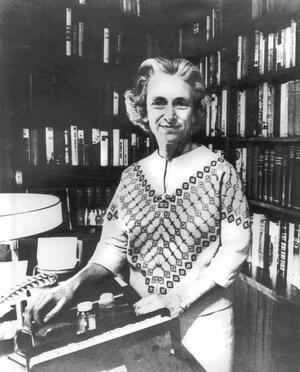Birth of Pulitzer Prize-winning historian Barbara W. Tuchman
Early in her career, Barbara Wertheim’s job was clipping and filing newspaper articles for The Nation magazine. The fact that her father had bought the publication to keep it from going bankrupt may have played a role in her getting the post, which introduced the budding historian to the world of journalism.
She became the foreign correspondent for The Nation during the Spanish Civil War and the build up to World War II. During the war, she prepared material for the US government’s Office of War Information for use in broadcasts to the Far East. With the end of the war, she left her job and settled down with her internist husband Lester Tuchman and three small children. Once the children began school, Barbara Tuchman embarked on what would become her life’s work—writing history.
''When the children were very small,'' she once recalled in an interview, ''I worked in the morning only and then gradually, as they spent full days at school, I could spend full days at work. I could never have done any of this work if I hadn't been able to afford domestic help.''
Her first books were on Britain and Palestine (Bible and Sword, 1956) and Germany and Mexico (The Zimmerman Telegram, 1958). Tuchman hit her stride in 1962 in her monumental and popular book on the prelude to World War I, ''the chasm between our world and a world that died forever,'' as she put it. The Guns of August humanized the personalities behind the war, garnered a Pulitzer Prize, and was the basis for a 1964 documentary film. Clifton Fadiman, writing in the Book-of-the-Month-Club News, said, ''Its virtues are almost Thucydidean: intelligence, concision, weight, detachment.''
Tuchman followed this success with Stilwell and the American Experience in China, 1911-45, which won another Pulitzer Prize, and The March of Folly: From Troy to Vietnam, chronicling the ramifications of foolishness as illustrated by the Trojan Horse.
With Tuchman’s belief that “books are humanity in print,” columnist Max Lerner wrote at her death in 1989 that her idea of heaven was the National Archives and the manuscript division of the Library of Congress.
Sources: “Barbara W. Tuchman Dead at 77; A Pulitzer-Winning Historian,” New York Times.



